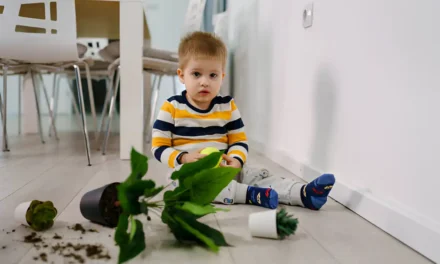Dealing with a defiant child can seem overwhelming, but it’s a common issue many families face. Creating a consistent morning routine is a good start. But, it’s just the beginning. Managing a strong-willed child needs patience, empathy, and smart strategies.
My youngest son, Ethan, entered the “terrible twos” with a bang. The tantrums and power struggles were tough. But, I learned that understanding and compassion are key, not punishment.
Key Takeaways
- Defiance can be a child’s way of reclaiming control and power over their life1
- Punishing a child for defiance can harm their self-acceptance and lead to questioning their own thoughts and feelings1
- Mindful acceptance and a calm, non-controlling response can help parents navigate defiant behaviors1
- Focusing on guiding and supporting children, rather than creating obedience, is crucial1
- Implementing logical consequences can reinforce expectations and responsibility2
In this article, I’ll share five strategies to manage a defiant child. We’ll cover understanding defiant behavior, setting clear boundaries, and improving communication. These tips can greatly improve your home’s harmony.
Understanding Defiant Behavior in defiant child
Defiant behavior in kids is a normal part of growing up. It shows they are learning to be independent and unique3. Symptoms like temper tantrums and not following rules can vary in how bad they are3.
ODD is more often seen in boys than girls. Kids with other mental health issues like mood disorders or ADHD are also more likely to have ODD3.
Defiance as a Normal Part of Child Development
Some defiance is okay as kids learn to be independent4. ODD symptoms usually start in preschool and can show up before the teen years4. This behavior is a way for kids to test limits and show they are in charge.
Triggers and Reasons for Defiant Behavior
Defiant behavior often comes from a kid’s need to control their life and challenge authority4. ODD symptoms last at least six months and cause big problems in school, work, and family life4. Things like emotional issues and bad parenting can make ODD more likely4.
| Defiant Behavior | Normal Defiance | Reasons for Defiant Behavior |
|---|---|---|
| Frequent temper tantrums, refusal to follow rules, and severe problems in relationships, social activities, school, and work | A natural and common part of a child’s development as they assert their independence and individuality | Desire to take control of their life, resist authority figures, emotional regulation issues, and inconsistent discipline |
It’s key for parents to know the difference between normal and serious defiance3. ODD is diagnosed if symptoms last six months and are seen in how the child acts with others3. Early help and good management can stop symptoms from getting worse and improve relationships4.
“Defiance is a natural part of a child’s development, but it’s important to distinguish between normal defiance and more problematic behavior that may require additional support.”
The Importance of Mindful Acceptance

In the complex world of parenting, mindful acceptance is key. It’s not just about accepting things as they are. It’s about being fully present and aware of your child’s actions without getting upset5.
This way, you can respond thoughtfully, avoiding quick reactions that might make things worse5.
Accepting the Child, Not the Behavior
It’s important to accept your child, not their actions. This helps them feel good about themselves and their emotions6. If you see them as “bad” because of their behavior, they might start to feel unworthy6.
Fostering Self-Acceptance and Emotional Health
By seeing your child as separate from their actions, you make them feel loved and valued6. This boosts their self-acceptance and emotional health. It helps them grow in a positive way6.
Parenting comes with its ups and downs. But with mindful acceptance, you can handle these challenges better56.
Avoiding Power Struggles and Negative Reactions
As a parent, it’s key to know that fighting power with defiant kids usually doesn’t work7. Kids want more control as they get older7. They think they’re as powerful as adults, which can cause trouble7. It’s better to stay calm and not try to control them.
Research shows that power struggles between parents and kids are more common now8. Kids often learn that being forceful gets them what they want8. But this can lead to big problems later8. Parents should learn how to handle defiant behavior without fighting for power.
- Offering choices can help avoid power struggles8.
- Give kids more freedom with more responsibility8.
- Use negotiations to find solutions8.
By avoiding power struggles and negative reactions, parents can help kids feel heard and learn to solve problems9. This method not only helps now but also prepares kids for the future9.
| Strategy | Description |
|---|---|
| Offer Choices | Providing children with options can help them feel empowered and avoid power struggles8. |
| Increase Responsibility | As a child’s autonomy increases, so should their level of responsibility and accountability8. |
| Negotiate Outcomes | Engage in discussions that involve proposals, compromises, and ways to measure success8. |
“The key is to avoid power struggles and negative reactions, and instead focus on positive communication and problem-solving strategies that empower children.”9
By using these methods and avoiding power struggles, parents can make a better environment for their defiant child to grow9.
Establishing Clear Boundaries and Limits
As a parent, setting up a safe space for your child’s curiosity is key10. This means setting clear rules for health and safety. You also need to enforce these rules with rewards and consequences10. This way, your child learns good behavior and feels safe, even when they test limits10.
Providing a Secure Container for Limit-Testing
Testing limits is normal for kids who are emotionally healthy10. It’s your job to guide them with love and firmness. You might need to set stricter rules and help them finish tasks11. This helps your child feel safe and learn to explore their world12.
Empowering Children Through Choices
Offering choices within limits empowers your child11. This makes them more willing to follow rules and less likely to act out. For instance, you could say, “You can play after your room is clean,” or “You can buy it with your own money.”11 Giving them some control makes them more involved and happy11.
Setting limits with love and reason is crucial for good parenting10. It might be hard for your child at first, but it’s essential for their emotional growth10. By being empathetic and understanding, you build a strong bond with your child11.
Effective Communication Strategies
Effective communication is crucial when dealing with a defiant child. Using positive language and giving instructions clearly helps build respect and cooperation13.
Using Positive Language and Avoiding Negatives
Instead of telling your child what not to do, tell them what you want them to do. This positive method avoids power struggles and encourages them to follow13. Keep your tone positive or neutral for a constructive talk13. Try not to get into debates or arguments, as they can make things worse13.
Giving Instructions Once and Following Through
Give instructions clearly and directly, making eye contact with your child13. Be clear and follow through with consequences if they don’t follow. This shows your child you mean business13. Saying thank you when they listen can also encourage good behavior13.
By using these effective communication strategies, you can handle defiant behavior with kindness. This strengthens your bond with your child. Learn more about peaceful parenting techniques13
Praise and Reinforce Positive Behaviors
When dealing with a defiant child, it’s key to praise positive behaviors and reinforce desirable actions. This method is very effective in promoting good behavior and improving your relationship with your child14.
Experts say to use a 4:1 ratio of praise to corrections. This is especially helpful for managing Oppositional Defiant Disorder (ODD)14. Giving specific praise for good actions is even more powerful14.
The Smarter Parenting Effective Praise skill has a four-step plan. It includes showing approval, describing the positive action, explaining why it’s good, and offering a reward14. This can boost your child’s self-esteem and lead to better behavior and relationships14.
Positive reinforcement is a strong tool for teaching kids to share, follow rules, and do chores15. Rewards and praise work better than punishment in teaching good behavior15. Young kids like sticker charts, while older ones might prefer token systems15.
It’s vital to give positive feedback regularly, especially when teaching new skills15. Praising good behavior right away is more effective than waiting until it’s done15.
By praising positive behaviors and reinforcing desirable actions, you create a positive cycle. This encourages your child to keep improving and grow into a well-adjusted person1415.
Defiant Child

Raising a defiant child can be tough for any parent. But, it’s key to know this behavior is normal in child development. Every parent faces some level of defiance. It doesn’t mean the child or parent is “bad.”16 Learning how to handle defiant behavior can make this phase easier for parents. It also supports their child’s growth.
Defiant behavior in kids can start early. Symptoms include being defiant, easily annoyed, and blaming others. They might also speak hatefully and have frequent tantrums17. It’s normal for kids to be oppositional at 2-3 years old and again in early teens17. But, it’s important to tackle it early to avoid daily life problems.
Oppositional Defiant Disorder (ODD) is a more serious form of defiance. It can last a long time and affect school and social life16. Kids with ODD are also at risk for depression, anxiety, and ADHD16. Understanding and addressing defiant behavior can help kids manage their emotions better.
One effective way to handle a defiant child is to avoid power struggles and negative reactions. Research shows spanking and punishments don’t work well16. Instead, set clear rules, give choices, and use positive communication. This builds a stronger bond between parent and child.
By understanding and addressing defiant behavior, parents can help their kids succeed. With patience, empathy, and teamwork, parents can create a supportive environment for their defiant child to grow1617.
Implementing Logical and Immediate Consequences
Dealing with a defiant child means setting clear consequences tied to their actions18. The Responsive Classroom approach focuses on logical consequences. These include fixing problems, losing a privilege, or giving space to regain control18. Teachers use these to stop bad behavior, keep everyone safe, and teach about responsibility18.
Immediate consequences are also vital. They show the direct link between actions and results19. Defiant kids often act to feel important. So, building positive relationships and praising effort is key19. Giving choices instead of orders helps them feel in control19.
It’s important to link the behavior to the consequence clearly, without extra punishment. For example, missing a curfew might mean an early bedtime, or backtalk could mean losing a privilege. These methods help manage defiance and teach kids about their actions’ impact1819.
Staying Calm and Avoiding Escalation
When dealing with a defiant child, it’s crucial to stay calm and avoid escalating the situation. As tempers rise, reacting in the heat of the moment can lead to more conflict. According to research, 83% of parents found that being calm, firm, and non-controlling reduced overreacting to their child’s behavior20.
Responding to Tantrums and Meltdowns
When your child throws a tantrum or has a meltdown, it’s important to respond effectively. Instead of engaging in a power struggle or punishing the behavior, try to stay composed. 72% of parents found that modeling and coaching self-discipline was the most effective discipline for managing their child’s behavior20.
Your child is likely overwhelmed and struggling to express their feelings. By staying calm and providing a supportive presence, you can help them regain control and learn healthier ways to cope with their emotions20.
| Effective Strategies for Responding to Tantrums | Ineffective Strategies for Responding to Tantrums |
|---|---|
|
|
95% of parents agreed that asking themselves three specific questions helped them manage their child’s emotions more effectively: “Is my child safe?”, “Is this a battle worth fighting?”, and “What is the best way to respond right now?”20
Remember, staying calm and avoiding escalation is key to effectively managing a defiant child’s behavior. By responding with patience and understanding, you can help your child learn to regulate their emotions and develop more positive coping strategies20.
Building a Positive Parent-Child Relationship
Creating a strong, caring bond with your child is key to handling defiant behavior21. Focus on building connection, understanding, and trust. Avoid power struggles. Spend quality time together and show your child you value their good qualities21.
This approach strengthens your bond and lessens the need for defiant actions. These actions often stem from a desire for attention or connection21.
Spending Quality Time and Showing Appreciation
Make time to do things your child loves21. It could be playing a game, going for a walk, or talking about their interests. Showing real interest in their life makes them feel valued and heard21.
Also, praise your child’s good actions with specific, detailed words22. This encourages them to keep up the good work22.
| Positive Relationship Strategies | Benefits |
|---|---|
| Spending Quality Time | Strengthens the parent-child bond, reduces the need for defiant behavior |
| Showing Appreciation | Motivates positive behaviors, reinforces the child’s sense of value |
By focusing on a positive relationship, your child will feel supported and valued. This can greatly reduce defiant behaviors21.
Age-Appropriate Strategies for Toddlers, Tweens, and Teens
Dealing with defiant behavior in kids needs a flexible approach that fits their age. Strategies for toddlers might not work for tweens and teens. This is because their needs and maturity levels change as they grow23.
Toddlers often have temper tantrums and act aggressively. These are normal parts of growing up23. To manage their behavior, create a calm space, let them choose, and praise them when they do well23.
When kids become tweens, parents face new challenges24. Tweens might try drugs and alcohol, and they could start to deal with sexual issues and eating disorders25. It’s key to talk openly, challenge gender stereotypes, and encourage healthy activities like sports25.
| Age Group | Developmental Challenges | Recommended Strategies |
|---|---|---|
| Toddlers (1-3 years) |
|
|
| Tweens (9-12 years) |
|
|
| Teens (13-19 years) |
|
|
In the teen years, kids often push for more freedom and independence24. To handle this, focus on respectful talks, set clear rules, and show good behavior yourself24.
By adapting their methods to the child’s age and stage, parents can tackle defiant behavior. This helps create a supportive environment for their child’s growth and well-being23.
Learning from Your Own Childhood Experiences
When dealing with your child’s defiant behavior, think about your own . Defiance in children is common among parents of all ages – toddlers, tweens, and teens26. Reflecting on your own experiences can help you understand your child better. It also helps you develop empathy and effective strategies.
Remember your childhood. How did your parents handle your defiance? Were they strict or understanding? Positive parenting strategies are tough, but they’re worth it for your child’s growth26.
Think about what you learned from your upbringing. Maybe harsh discipline made you feel resentful. Or perhaps patient parenting taught you to cooperate better. These skills are crucial for school and work26.
“The way we were parented often shapes the way we parent our own children. By understanding our past experiences, we can break negative cycles and build healthier, more positive relationships with our kids.”
As you manage your child’s defiance, use what you learned from your own childhood. Praise good behavior to encourage it26. Speak positively to improve communication and cooperation26. Make sure consequences for bad behavior are clear26.
During arguments or tantrums, stay calm to calm things down faster26. Use quick and fair discipline to address defiance26. Positive interactions with your child can strengthen your bond and improve their behavior26.
Your experiences offer valuable lessons for managing a defiant child. Reflect on the past, learn from it, and use those lessons to improve your relationship with your child.
Seeking Professional Help When Needed
While many families find success with the strategies in this article, sometimes Seek Professional Help is needed. If defiant behavior doesn’t improve or worsens, or if the relationship with your child is still strained, it’s time to seek help. Getting professional support can offer a new perspective and specialized skills to tackle these challenges.
Studies show that about 3.3% of kids worldwide have Oppositional Defiant Disorder (ODD)27. ODD is more common in poor areas27. Before they hit their teens, boys are more likely to have ODD, but this changes as they get older27. Family doctors often help by checking for ODD and guiding families to local resources27.
When you seek help, you’ll get a detailed evaluation and a plan tailored just for you. Treating ODD usually involves family therapy that can last months or even years28. Medication might be used if the child also has another mental health issue28. Teaching parents new skills is a big part of the treatment28.
Other effective therapies might include Parent-Child Interaction Therapy (PCIT), individual and family therapy, and training in problem-solving and social skills28. It’s important for parents to set clear rules, enforce them consistently, and praise good behavior28. Counseling for the family and learning how to cope can also help manage ODD28.
Remember, Seek Professional Help is crucial when dealing with persistent defiant behavior or strained relationships. With the right support and strategies, families can overcome these challenges and build a stronger, more positive bond.
Conclusion
Managing a defiant child needs patience, understanding, and proven strategies. Recognizing that defiance is normal in child development29 helps. It lets you build a strong parent-child bond and teach your child to be cooperative and respectful.
Setting clear boundaries, talking effectively, and using logical consequences helps manage defiance. Dr. Randy Cale’s “Defiant Child Program” has helped over 7,000 families. It shows a success rate of 98%30.
The defiant phase is just a part of a child’s growth. With the right tools and support, it can be overcome. Staying calm and building a positive relationship helps your child grow. With patience and understanding, you can help your child reach their full potential.
FAQ
What are the most successful ways to manage defiant children at home and in the classroom?
Is defiant behavior a sign of a “bad” child or poor parenting?
Why is mindful acceptance important when dealing with a defiant child?
How should parents avoid power struggles with a defiant child?
How can parents establish clear boundaries and limits with a defiant child?
What effective communication strategies can help when dealing with a defiant child?
How can parents effectively praise and reinforce positive behaviors in a defiant child?
Is defiant behavior a normal part of child development?
What types of logical and immediate consequences can be effective for managing defiant behavior?
How can parents stay calm and avoid escalation when dealing with defiant behavior, tantrums, or meltdowns?
How can building a positive parent-child relationship help manage a defiant child?
How should parents adapt their strategies as the defiant child grows older?
How can reflecting on their own childhood experiences help parents manage a defiant child?
When should parents seek professional help for managing a defiant child?
Source Links
- Accepting a Defiant Child – Peaceful Parents, Confident Kids
- Dealing Effectively with Defiant Young Children and Toddlers
- Oppositional Defiant Disorder (ODD) in Children
- Oppositional defiant disorder (ODD) – Symptoms and causes
- A Model of Mindful Parenting: Implications for Parent–Child Relationships and Prevention Research
- Mindful Parenting Helps Create Healthier Parent-Child Relationships
- Parenting Power Struggles – Do You Have a Defiant Child
- Avoid Power Struggles with Children | Empowering Parents
- Avoiding Power Struggles with Kids
- Setting Limits with Difficult Kids | Empowering Parents
- How to Peacefully Teach and Set Clear Limits, Boundaries and Consequences with Your Child — LOUISE SHALDERS
- Establishing Age-Appropriate Boundaries With Kids: How to Set Limits That Kids Want to Follow
- Gentle Parenting – Connection Before Correction – Counseling
- Parenting child with ODD using descriptive praise – Smarter Parenting
- How Positive Reinforcement Encourages Good Behavior in Kids
- 8 Effective Ways to Handle Defiant Children
- 9 Tips for Dealing With Defiant Children
- Logical Consequences
- When Children Are Defiant
- How to Help Defiant Children Regulate Their Emotions
- One Simple Trick for Dealing with Defiance Positively – A Fine Parent
- How to Parent a Defiant Teen – Child Mind Institute
- Is My Child Acting Out or Is It Age-Appropriate Behavior?
- Defiant Students | Dealing with Defiance in Children and Teens at School
- 10 Tips for Parenting Preteens – Child Mind Institute
- The simplest ways to make the best of the defiant child years
- Common Questions About Oppositional Defiant Disorder
- Oppositional defiant disorder (ODD) – Diagnosis and treatment
- 3 Normative Explanations for The “Defiant” Child
- The Defiant Child – Terrific Parenting by Dr. Randy Cale





